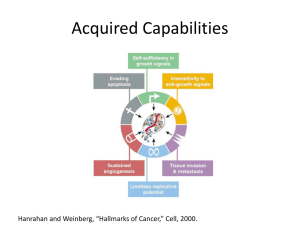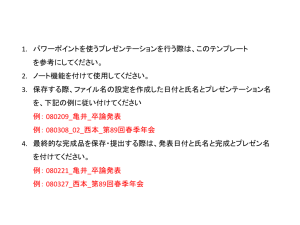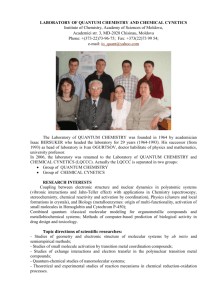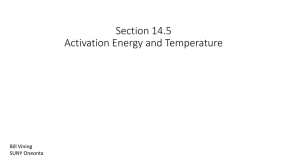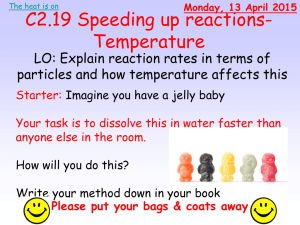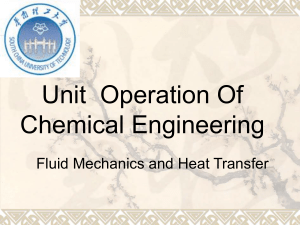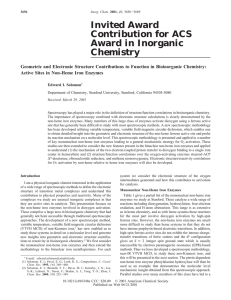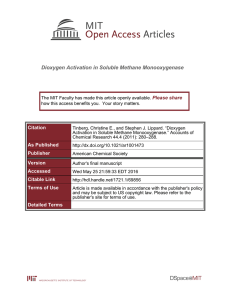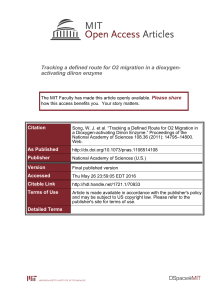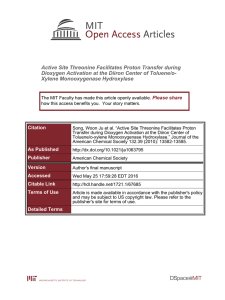5 Slides About: Dioxygen Activation in Non
advertisement
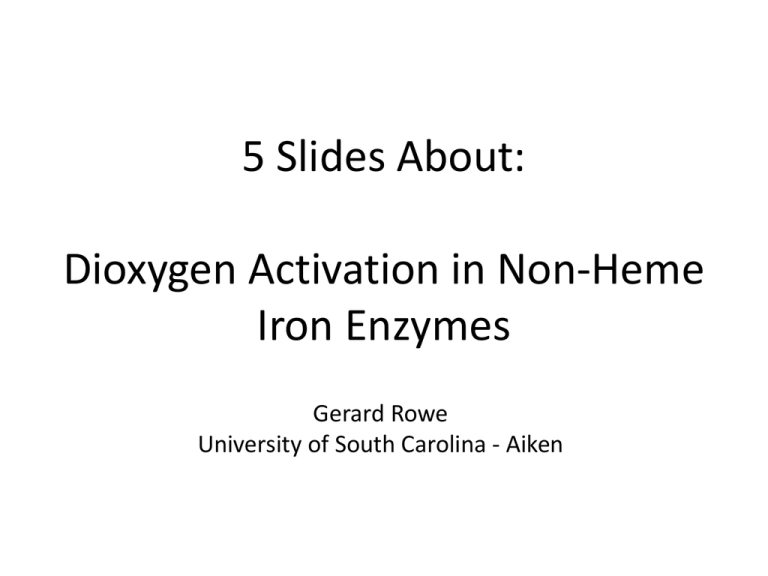
5 Slides About: Dioxygen Activation in Non-Heme Iron Enzymes Gerard Rowe University of South Carolina - Aiken Dioxygen Activation In general, the biological utilization of dioxygen is a 4-electron process Metabolic Utilization (Cytochrome c oxidase) Monooxygenase Activity (Methane Monooxygenase) Dioxygenase Activity (Intradiol Ring Cleaving Dioxygenase) Heme vs. Non-Heme Oxidases General Heme Protein Environment Taurine a-Ketoglutarate Dioxygenase X = SMet/Cys, NHis, OTyr Utilizes an a-ketoacid cofactor as a source of electrons Porphyrin ligand is redox active Usually tailored to one substrate Usually nonspecific oxidases Mononuclear Non-Heme O2 Activation Aromatic Amino Acid Hydroxylases Use a Pterin Cofactor that Provides Two Reducing Equivalents Binuclear Non-Heme O2 Activation Binuclear iron enzymes generally do not utilize a cofactor, receiving their electrons from a reductase subunit, instead. Detailed Look at Activation Mechanism Addition of O2 to MMORed results in an unobserved, but kinetically implicated species O Heterolytic Cleavage of peroxo bond (P Q) forms a Fe(IV)Fe(IV)-oxo species, termed Q. sMMOOx can directly convert to P by the addition of peroxide. *Rates reported at 4ºC Why Use Non-Heme Oxygenases? Oxygen is dangerous. One misfire of the enzyme can hydroxylate the active site, rendering it useless. Heme oxygenases like P450 can hydoxylate nearly anything, but lack control and tunability. Non-heme oxygenases are customizable, and the potency of the intermediate can be reduced. References for Further Study Mononuclear Enzymes: Kappock, T. J.; Caradonna, J. P. "Pterin-dependent amino acid hydroxylases." Chem. Rev. 1996, 96, 2659. Glickman, M. H.; Klinman, J. P. "Lipoxygenase reaction mechanism: Demonstration that hydrogen abstraction from substrate precedes dioxygen binding during catalytic turnover." Biochemistry 1996, 35, 12882. Riggs-Gelasco, P. J.; Price, J. C.; Guyer, R. B.; Brehm, J. H.; Barr, E. W.; Bollinger, J. M.; Krebs, C. "EXAFS spectroscopic evidence for an Fe = O unit in the Fe(IV) intermediate observed during oxygen activation by taurine :alpha-ketoglutarate dioxygenase." J. Am. Chem. Soc. 2004, 126, 8108. Bertini, I.; Briganti, F.; Mangani, S.; Nolting, H. F.; Scozzafava, A. "Biophysical investigation of bacterial aromatic extradiol dioxygenases involved in biodegradation processes." Coord. Chem. Rev. 1995, 144, 321. Wackett, L. P. "Mechanism and applications of Rieske non-heme iron dioxygenases." Enzyme Microb. Technol. 2002, 31, 577. Binuclear Enzymes: Baik, M. H.; Newcomb, M.; Friesner, R. A.; Lippard, S. J. "Mechanistic studies on the hydroxylation of methane by methane monooxygenase." Chem. Rev. 2003, 103, 2385. Wallar, B. J.; Lipscomb, J. D. "Dioxygen activation by enzymes containing binuclear nonheme iron clusters." Chem. Rev. 1996, 96, 2625.
